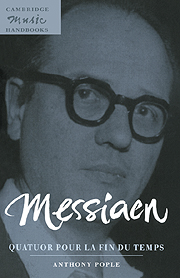Book contents
- Frontmatter
- Contents
- Acknowledgements
- Introduction
- 1 ‘Liturgie de cristal’
- 2 ‘Vocalise, pour l'Ange qui annonce la fin du Temps’
- 3 ‘Abîme des oiseaux’
- 4 ‘Intermède’
- 5 ‘Louange à l'Éternité de Jésus’
- 6 ‘Danse de la fureur, pour les sept trompettes’
- 7 ‘Fouillis d'arcs-en-ciel, pour l'Ange qui annonce la fin du temps’
- 8 ‘Louange à l'Immortalité de Jésus’
- 9 Contexts
- Appendix: Messiaen's modes à transpositions limitées
- Notes
- Select bibliography
- Index
5 - ‘Louange à l'Éternité de Jésus’
Published online by Cambridge University Press: 05 June 2012
- Frontmatter
- Contents
- Acknowledgements
- Introduction
- 1 ‘Liturgie de cristal’
- 2 ‘Vocalise, pour l'Ange qui annonce la fin du Temps’
- 3 ‘Abîme des oiseaux’
- 4 ‘Intermède’
- 5 ‘Louange à l'Éternité de Jésus’
- 6 ‘Danse de la fureur, pour les sept trompettes’
- 7 ‘Fouillis d'arcs-en-ciel, pour l'Ange qui annonce la fin du temps’
- 8 ‘Louange à l'Immortalité de Jésus’
- 9 Contexts
- Appendix: Messiaen's modes à transpositions limitées
- Notes
- Select bibliography
- Index
Summary
Jesus is here considered as the Word. A long phrase for the cello, infinitely slow, magnifies with love and reverence the eternity of this powerful and gentle Word, ‘which the years can never efface’. Majestically, the melody unfolds in a kind of tender and supreme distance. ‘In the beginning was the Word, and the Word was in God, and the Word was God.’
A number of commentators have expressed misgivings about the implications of Messiaen's transcription of this movement, along with the final movement of the Quatuor, from earlier compositions in which the music does not have the same verbal connotations. Paul Griffiths, for example, observes that
although it may be no great distance … from seeing water as a ‘symbol of Grace and Eternity’ in Fête des belles eaux to conceiving the same music as illustrative of the ‘Eternity of Jesus’, the introduction of the Word can scarcely be dismissed as insignificant.
Be that as it may, a closer look at Messiaen's description of Fête des belles eaux suggests that the two conceptions were not so very different. The work was composed as one of twenty commissioned by the City of Paris at the time of the great international Exhibition of 1937:
The City of Paris had organised an entertainment of sound, water and light, which unfolded on the river Seine at night … The sounds were to be amplified by loudspeakers placed on all the buildings in the vicinity of the Seine, the ondes lending themselves marvellously to this open-air music [musique de plein air]. … […]
- Type
- Chapter
- Information
- Messiaen: Quatuor pour la fin du temps , pp. 53 - 63Publisher: Cambridge University PressPrint publication year: 1998



